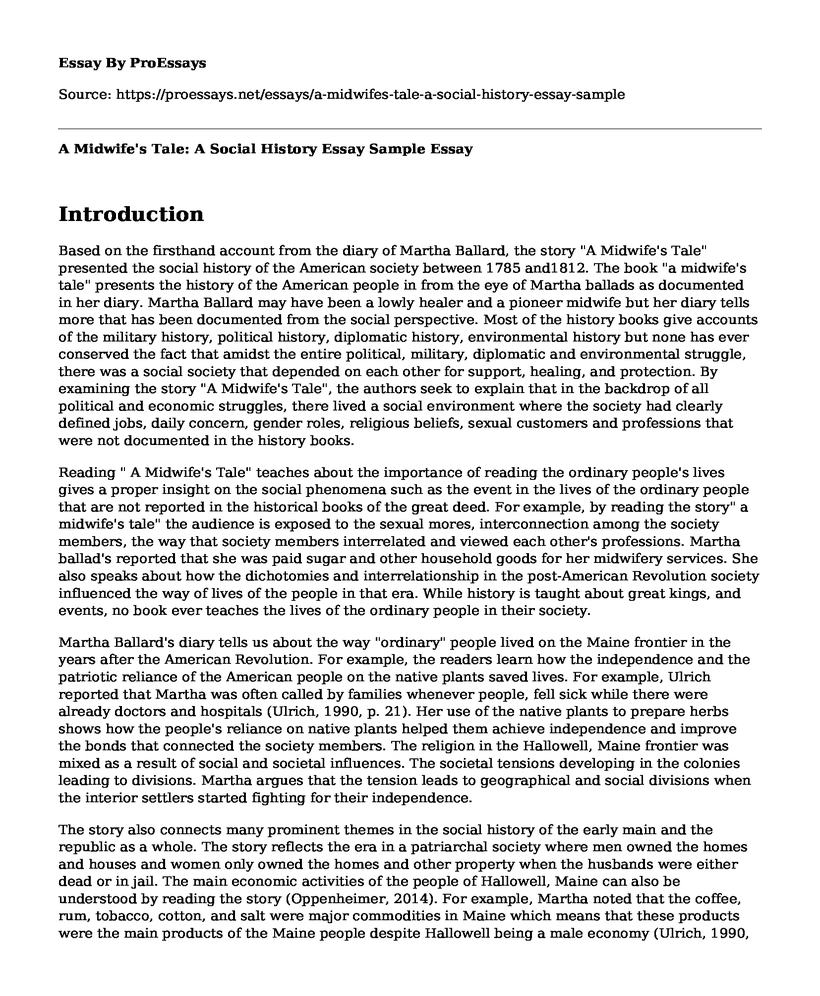Introduction
Based on the firsthand account from the diary of Martha Ballard, the story "A Midwife's Tale" presented the social history of the American society between 1785 and1812. The book "a midwife's tale" presents the history of the American people in from the eye of Martha ballads as documented in her diary. Martha Ballard may have been a lowly healer and a pioneer midwife but her diary tells more that has been documented from the social perspective. Most of the history books give accounts of the military history, political history, diplomatic history, environmental history but none has ever conserved the fact that amidst the entire political, military, diplomatic and environmental struggle, there was a social society that depended on each other for support, healing, and protection. By examining the story "A Midwife's Tale", the authors seek to explain that in the backdrop of all political and economic struggles, there lived a social environment where the society had clearly defined jobs, daily concern, gender roles, religious beliefs, sexual customers and professions that were not documented in the history books.
Reading " A Midwife's Tale" teaches about the importance of reading the ordinary people's lives gives a proper insight on the social phenomena such as the event in the lives of the ordinary people that are not reported in the historical books of the great deed. For example, by reading the story" a midwife's tale" the audience is exposed to the sexual mores, interconnection among the society members, the way that society members interrelated and viewed each other's professions. Martha ballad's reported that she was paid sugar and other household goods for her midwifery services. She also speaks about how the dichotomies and interrelationship in the post-American Revolution society influenced the way of lives of the people in that era. While history is taught about great kings, and events, no book ever teaches the lives of the ordinary people in their society.
Martha Ballard's diary tells us about the way "ordinary" people lived on the Maine frontier in the years after the American Revolution. For example, the readers learn how the independence and the patriotic reliance of the American people on the native plants saved lives. For example, Ulrich reported that Martha was often called by families whenever people, fell sick while there were already doctors and hospitals (Ulrich, 1990, p. 21). Her use of the native plants to prepare herbs shows how the people's reliance on native plants helped them achieve independence and improve the bonds that connected the society members. The religion in the Hallowell, Maine frontier was mixed as a result of social and societal influences. The societal tensions developing in the colonies leading to divisions. Martha argues that the tension leads to geographical and social divisions when the interior settlers started fighting for their independence.
The story also connects many prominent themes in the social history of the early main and the republic as a whole. The story reflects the era in a patriarchal society where men owned the homes and houses and women only owned the homes and other property when the husbands were either dead or in jail. The main economic activities of the people of Hallowell, Maine can also be understood by reading the story (Oppenheimer, 2014). For example, Martha noted that the coffee, rum, tobacco, cotton, and salt were major commodities in Maine which means that these products were the main products of the Maine people despite Hallowell being a male economy (Ulrich, 1990, p. 17). It is from the dairies that the audience also learns that the women and men worked together in sustaining their economy.
It is through the story of the ordinary people's lives that the gaps in the history books are bridged. For example, the history books only speak about men and great achievers and do not tell the story of men and women. Through Martha's story, the audiences get to know about the missing work-and trade-of women (Oppenheimer, 2014). For example, history books stated that the Kennebec women played no economic roles in their households unless when their husband died as Martha writers about Ephraim Ballard who had to plant the flax and later assisted by her daughters and female neighbors with combing, spinning, reeling, boiling, spooling, warping, quilting, weaving, bucking, and bleaching to transform the ripe plan into finished clothes (Ulrich, 1990, p. 29).
Conclusion
By reading "A Midwife's Tale" by Ulrich adapted from the diary of Martha Ballad, one can easily understand the social history of the people and the economic history of the people of Maine. In fact, the audience can learn more about the 18th-century world of war, politics, and economics from reading Martha's story that can be learned from other history books. The lives of ordinary people tell more about the societal and political pressures that shaped the 18th century as the ordinary man was affected and had a greater influence on the political outcomes of the society.
Reference
Ulrich LT. "A Midwife's Tale: The Life of Martha Ballard Based on Her Diary," 1785-1812. New York: Alfred A. Knopf; 1990.
Oppenheimer, R. (2014). Midwife [Video]. Retrieved from https://www.youtube.com/watch?v=I67-y38CB0o
Cite this page
A Midwife's Tale: A Social History Essay Sample. (2022, Aug 15). Retrieved from https://proessays.net/essays/a-midwifes-tale-a-social-history-essay-sample
If you are the original author of this essay and no longer wish to have it published on the ProEssays website, please click below to request its removal:
- Heart of Darkness by Joseph Conrad Essay Example
- The Surprising Power of Questions Article Review
- Death of a Salesman Idealism and Truth Essay
- Essay Example on Leslie Silko's Poem: Exploring Nature's Beauty
- Book Review Sample on The Tale-Tell Heart
- Free Paper Sample: Mobile Home Resident / Symbol Management
- Essay Example on Minorities in Information Technology







